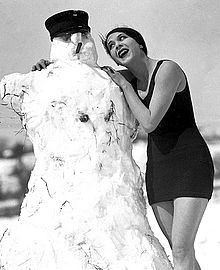|
Fritzi Ridgeway
Fritzi Ridgeway (April 8, 1898 – March 29, 1961),[1] sometimes credited as Fritzie Ridgeway, was an American silent film actress, vaudeville performer, and hotelier. Although she starred in numerous films, she is perhaps best known for her work in silent Western films. Born Fredricka Berneice Hawkes, a native of Montana, Ridgeway worked as both a vaudeville performer and a professional trick rider before making her film debut in 1916. She appeared in 63 films between 1916 and 1934, with prominent roles in Western films populating much of her early career. Other notable roles include supporting parts in Tod Browning's drama The Unpainted Woman (1919) and The Enemy (1927). Ridgeway officially retired from acting in 1934, making her final screen appearance in Rouben Mamoulian's We Live Again. She spent the latter half of her life managing the Hotel del Tahquitz in Palm Springs, California, a hotel she built in 1928. She remained the proprietor of the Hotel del Tahquitz until her death in 1961.[2][3] She was married to Russian composer Constantin Bakaleinikoff. In L.A. Exposed: Strange Myths and Curious Legends in the City of Angels, historian Paul Young noted Ridgeway as an "iconoclastic silent film star."[4] Early lifeRidgeway was born Fredricka Berneice Hawkes on April 8, 1898 in Missoula, Montana,[5][6][7] later moving with her family to Butte, where she attended primary school.[8][9] Prior to establishing herself as a film actress, Ridgeway worked as both a vaudeville performer and as a trick rider.[8] As a teenager, Ridgeway traveled with her family between Montana and California, and attended Hollywood High School in Los Angeles.[10] She was also educated in Chicago.[10] CareerEarly films She made her film debut in the short The Bridesmaid's Secret (1916), and appeared later that year in the title role of the feature film The Little Girl Next Door. The following year brought her first feature film role in a Western, The Hero of the Hour (1917). Ridgeway would appear in several silent Western shorts after, including The Wrong Man (1917) and The Soul Herder (1917). Her appearances in Westerns earned her the name of the "cowgirl star" early in her career.[11] She appeared as Evelyn Hastings in the 1917 picture The Learnin' of Jim Benton opposite Roy Stewart, and was noted in a review for her "delightful" performance in the film.[12] In 1919, Ridgeway appeared in Victor Schertzinger's comedy When Doctors Disagree, followed by a supporting part in Tod Browning's drama The Unpainted Woman (1919) for Universal Pictures.[13] She would continue to play in silent pictures into the late 1920s, including roles in the drama The Old Homestead (1922), the Western Ruggles of Red Gap (1923), and the drama The Enemy (1927), opposite Lillian Gish.[14] Later work and retirementIn 1932, she appeared in the pre-Code film Ladies of the Big House, starring Sylvia Sidney and Gene Raymond, which received positive critical acclaim with a review in The New York Times noting, "the film manages to convey this terror with a fair measure of success."[15] In 1934, she appeared in a supporting part in the horror film House of Mystery (1934) opposite Verna Hillie and John Sheehan.[16] Ridgeway made her final screen appearance in a minor uncredited role in We Live Again (1934),[17] an adaptation of Leo Tolstoy's Resurrection, before retiring from acting. Ridgeway spent her remaining years managing the Hotel del Tahquitz, a 100-room hotel which she had built in Palm Springs, California in 1928.[3][18] Personal lifeOn November 23, 1916, Ridgeway married John Charles Webb Dill of Hollywood.[19] Ridgeway married Russian composer Constantin Bakaleinikoff in Cincinnati, Ohio on December 23, 1925.[20] In March 1928, Ridgeway commissioned architect Anthony Miller to design a home for her, which was built in Los Angeles, California.[21] She would later marry Walter D. Simm, with whom she remained married until her death of a heart attack in 1961, aged 62.[22] Filmography
References
Works cited
Further reading
External links
|
||||||||||||||||||||||||||||||||||||||||||||||||||||||||||||||||||||||||||||||||||||||||||||||||||||||||||||||||||||||||||||||||||||||||||||||||||||||||||||||||||||||||||||||||||||||||||||||||||||||||||||||||||||||
